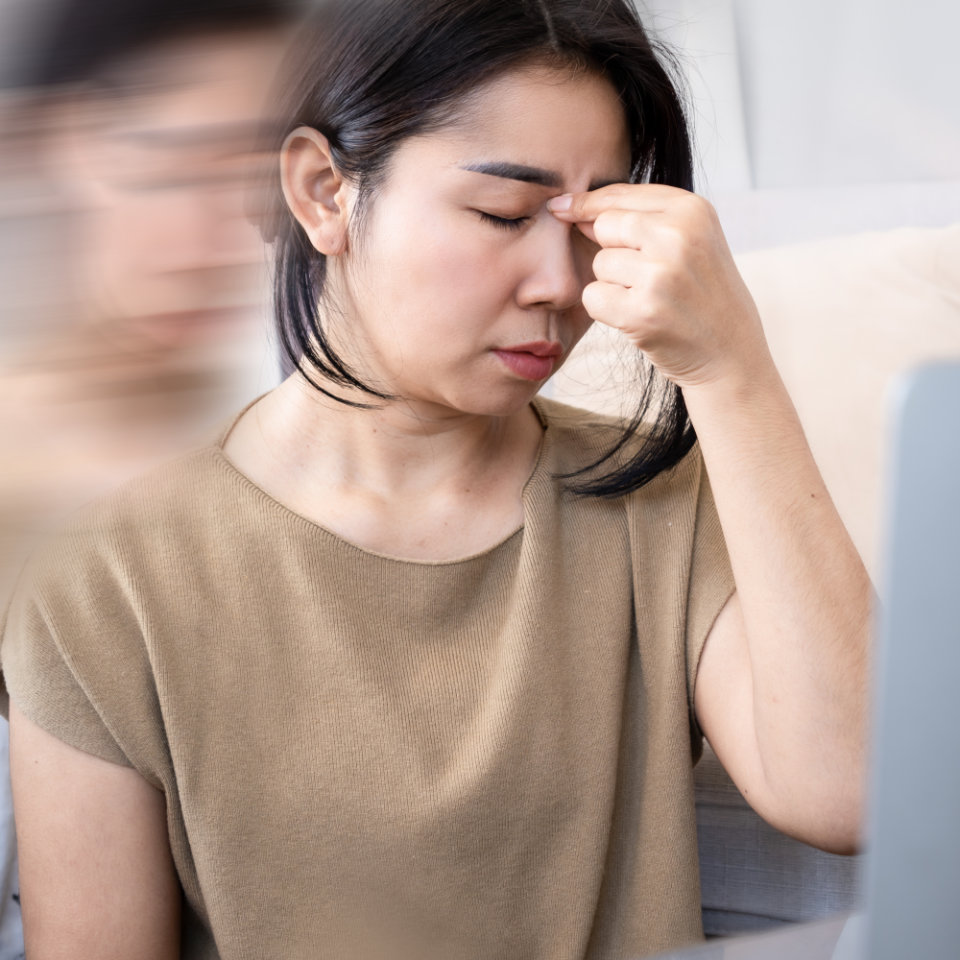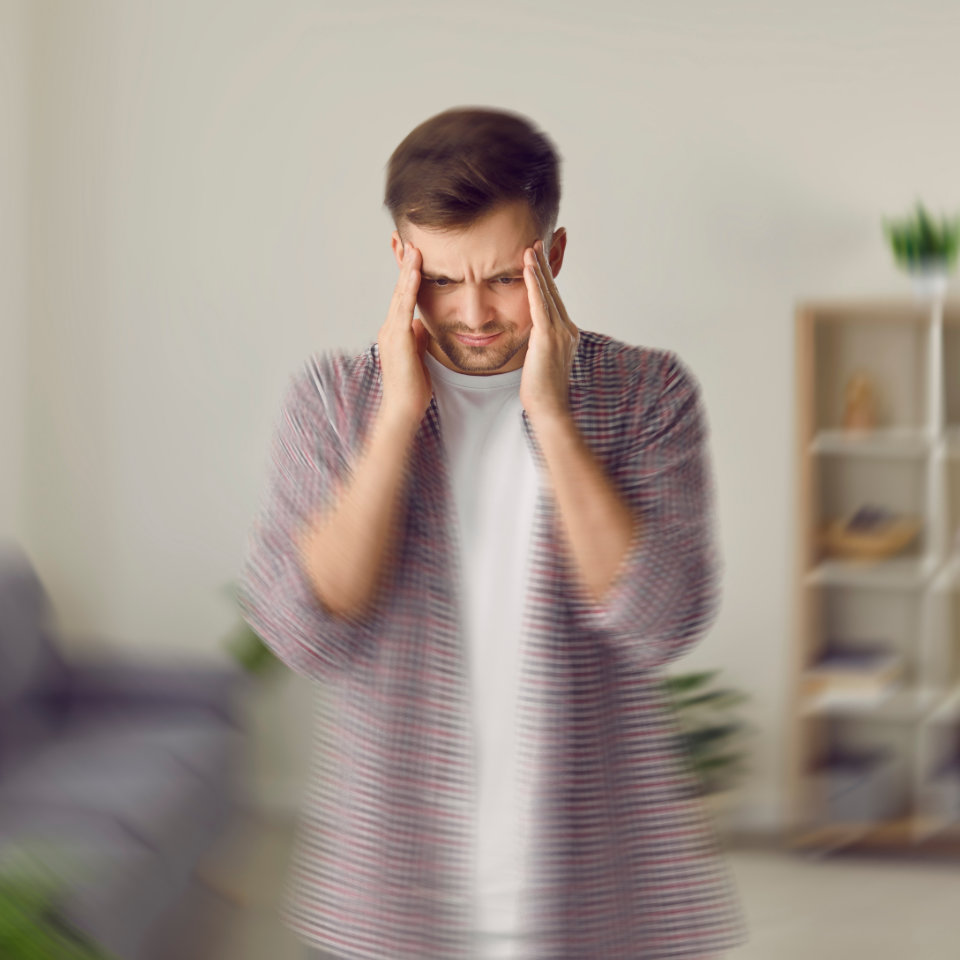Imagine suddenly feeling as if the room is spinning around you, struggling to maintain your balance, or experiencing a sensation of movement when you’re perfectly still. These disorienting symptoms characterize vertigo and balance disorders, conditions that affect millions of Americans and can significantly impact daily activities. We have formed a team of providers specially trained to diagnose and treat these complex conditions, helping Long Island patients regain stability and confidence.

Our Expertise and Philosophy
Our team brings extensive experience in diagnosing and treating balance disorders, with a distinctive approach that addresses both symptoms and underlying causes. Unlike general practitioners who may only treat symptoms temporarily, our practice conducts thorough evaluations to identify the precise mechanisms disrupting your balance system.
We believe that effective treatment requires understanding the intricate relationship between the inner ear’s vestibular system, the brain, and other sensory inputs that contribute to balance. This comprehensive perspective allows us to develop targeted treatment plans that provide both immediate relief and long-term solutions.
What Are Balance Disorders and Vertigo?
Balance disorders encompass a range of conditions that disrupt your body’s ability to maintain proper spatial orientation. The vestibular system in your inner ear works in coordination with your eyes, joints, muscles, and brain to maintain balance. When any part of this complex system is disrupted, balance problems can occur.
Vertigo is a specific type of balance disorder characterized by a false sensation of spinning or movement. Unlike general dizziness, which may feel like lightheadedness or faintness, true vertigo creates a distinct spinning or whirling sensation that can be severely disorienting and often worsens with head movements.
Common Concerns and Reasons Patients Seek Treatment
Patients experiencing balance disorders often share similar concerns and challenges:
Safety and Fall Prevention
Many patients worry about falling due to sudden episodes of vertigo or persistent imbalance, particularly older adults for whom falls can have serious consequences.
Disruption of Daily Activities
Balance disorders can make everyday activities–from driving to shopping to working–difficult or impossible during episodes, significantly impacting independence and quality of life.
Anxiety and Isolation
The unpredictable nature of vertigo can lead to anxiety about when the next episode might occur, causing some patients to withdraw from social activities and become isolated.
Misdiagnosis or Ineffective Treatments
Many patients have previously received incomplete diagnoses or treatments that only temporarily masked symptoms rather than addressing root causes.
Associated Symptoms
Patients often struggle with accompanying symptoms like nausea, hearing changes, cognitive fog, or fatigue that compound the impact of balance issues.
Our Customized Approach to Balance Disorders
Our approach to diagnosing and treating balance disorders is both methodical and personalized, focusing on identifying the specific mechanism causing your symptoms.
Comprehensive Vestibular Evaluation
Our diagnostic process includes detailed history-taking, physical examination with specialized vestibular testing, and when appropriate, advanced imaging studies. This thorough approach allows us to differentiate between the many potential causes of balance problems.
Multidisciplinary Coordination
For complex cases, our providers collaborate with neurologists, audiologists, and physical therapists specializing in vestibular rehabilitation to ensure comprehensive care. This team approach ensures all aspects of your condition are addressed.
Minimally Invasive Interventions
Whenever possible, we employ non-invasive or minimally invasive treatments to resolve balance disorders. For conditions like BPPV, specialized repositioning maneuvers can often provide immediate relief without medication.
Integration of Conventional and Holistic Approaches
Our treatment plans may incorporate traditional medical therapies alongside dietary modifications, nutritional supplements, and lifestyle adjustments to provide more comprehensive and sustainable results.
Is Treatment Right for You?
Most patients with significant vertigo or balance disorders are candidates for treatment, but the specific approach depends on your diagnosis, symptom pattern, and overall health. Treatment is particularly beneficial for:
- Individuals experiencing recurring episodes of vertigo
- Those with imbalance that affects daily activities or increases fall risk
- Patients with vertigo accompanied by hearing changes or ear fullness
- Individuals whose symptoms have not responded to previous treatments
- People taking multiple medications for dizziness without lasting relief
During your consultation, our provider will thoroughly evaluate your condition and discuss whether you’re a candidate for specialized treatment. For most patients, appropriate intervention can significantly reduce or eliminate symptoms and improve quality of life.
What to Expect During Your Evaluation
Your initial visit focuses on comprehensive assessment and typically includes:
Detailed Medical History
A member of our team will discuss your symptoms, when they began, what triggers them, and how they affect your daily life. He’ll also review your medical history, medications, and previous treatments.
Specialized Physical Examination
The examination includes tests of eye movements, balance function, and positional testing to evaluate how different head positions affect your symptoms.
Diagnostic Testing
Depending on your symptoms, we may perform specialized tests including:
- Videonystagmography (VNG) to record eye movements during various positional changes
- Audiometric testing to evaluate hearing function
- Balance platform testing to assess overall stability
- Electrocochleography for patients with suspected Meniere’s disease
Discussion of Findings
After completing the evaluation, our specialist will explain your diagnosis and recommended treatment options in clear, understandable terms.
Common balance disorders we treat include:
Benign Paroxysmal Positional Vertigo (BPPV)
A common inner ear condition causing brief episodes of vertigo triggered by specific head movements due to displaced calcium crystals in the inner ear.
Meniere's Disease
A chronic inner ear disorder causing episodes of vertigo, fluctuating hearing loss, ringing in the ears, and a feeling of fullness in the affected ear.
Vestibular Neuritis
An inflammation of the vestibular nerve usually caused by viral infections, resulting in sudden, severe vertigo that gradually improves over days or weeks.
Labyrinthitis
An inner ear infection causing both vertigo and hearing changes, often following an upper respiratory infection.
Vestibular Migraine
Episodes of vertigo associated with migraine headaches or migraine-related symptoms like sensitivity to light or sound.
What to Expect During Treatment
Treatment for balance disorders varies based on diagnosis but may include:
Canalith Repositioning Procedures
For BPPV, our specialists perform the Epley maneuver or similar repositioning techniques that move displaced calcium crystals back to their proper location in the inner ear. These procedures are done in-office and can often provide immediate relief.
Medication Therapy
For conditions like vestibular neuritis or Meniere’s disease, targeted medications may be prescribed to reduce vertigo, manage associated symptoms like nausea, or address underlying inflammation.
Vestibular Rehabilitation Therapy
Our specialists coordinate with specialized physical therapists who develop customized exercise programs that help your brain compensate for inner ear disorders. These exercises gradually retrain your balance system and reduce symptoms over time.
Lifestyle and Dietary Modifications
For conditions affected by dietary factors, like Meniere’s disease or vestibular migraine, specific dietary changes may be recommended, such as reducing salt, caffeine, or certain trigger foods.
Surgical Intervention
In rare cases where conservative treatments aren’t effective, surgical options may be considered.
Follow-Up Care
Most treatment plans include regular follow-up visits to monitor progress and adjust therapy as needed. The frequency depends on your specific condition and response to treatment.

Frequently Asked Questions About Balance Disorders and Vertigo
True vertigo creates a distinct spinning or whirling sensation, while general dizziness may feel more like lightheadedness or unsteadiness. Vertigo often worsens with head movements and may be accompanied by nausea or difficulty maintaining balance.
Some forms of vertigo, particularly those caused by infections, may improve without treatment. However, conditions like BPPV or Meniere’s disease typically require proper diagnosis and treatment for effective resolution.
Treatment effectiveness varies by condition. BPPV repositioning maneuvers often provide immediate relief, while vestibular rehabilitation therapy typically shows gradual improvement over 4-8 weeks of consistent practice.
Most patients don’t require long-term medication. For episodic conditions like Meniere’s disease or vestibular migraine, medications may be used intermittently to manage flare-ups while other treatments address underlying causes.
Yes, children can experience vertigo, though they may describe it differently than adults. Conditions like vestibular migraine and BPPV can affect children and are treatable with age-appropriate modifications to standard therapies.
Prevention strategies vary by diagnosis but may include vestibular exercises, avoiding specific triggers, dietary modifications, stress management, and proper sleep hygiene.
Why Choose Integrative ENT for Balance Disorder and Vertigo Treatment
Navigating balance disorders can be confusing and frustrating, but you don’t have to go it alone. At Integrative Ear, Nose & Throat, our team of ENT specialists has decades of experience diagnosing and managing conditions like vertigo, BPPV, vestibular neuritis, and Meniere’s disease.
What sets us apart:
- ENT providers with specialized training in vestibular and balance disorders
- In-depth evaluations using advanced vestibular testing and diagnostic tools
- Personalized care plans built around your specific diagnosis and daily challenges
- Collaborative care model with physical therapists and neurologists when needed
- A holistic approach that may include lifestyle, dietary, and medical recommendations
- Trusted by Long Island patients and honored repeatedly by NY Top Docs
We’re committed to helping you regain stability and confidence, whether you’re managing occasional episodes or chronic balance concerns.
Rediscover Stability and Confidence with Expert Care in Long Island
Living with vertigo or balance disorders doesn’t have to mean limiting your activities or living in fear of the next episode. With proper diagnosis and treatment, most patients experience significant improvement and regain the confidence to fully participate in daily activities.
If you’re experiencing dizziness, vertigo, or balance problems, contact our office to schedule a consultation. With convenient locations serving communities throughout Nassau and Suffolk County, expert care for balance disorders is accessible and comprehensive.
